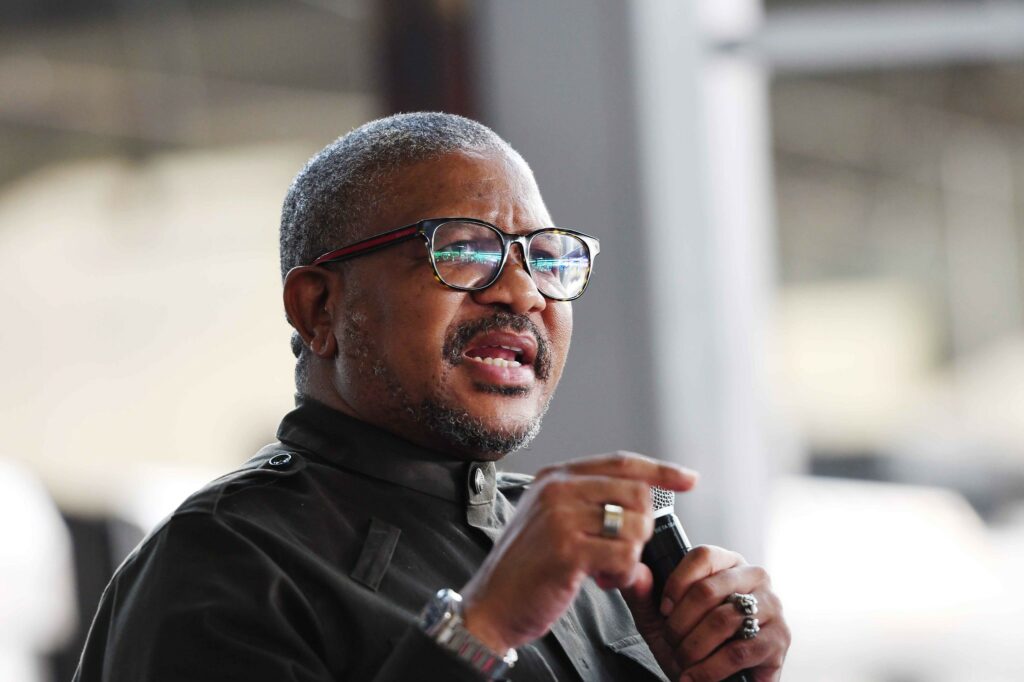A bitter and highly publicised dispute has erupted within ANC, involving the current Secretary General, Fikile Mbalula, and his expelled predecessor, Ace Magashule. This heated conflict has sent shockwaves through the party, raising concerns about its unity, stability, and the potential ramifications for its future direction.
In failing to rein in his party T-shirt-burning, Free State supporters, Magashule provoked the ire of Mbalula, who in retaliation, cancelled his planned meeting with Magashule, endorsed by ANC president Cyril Ramaphosa, that was meant to take place on Tuesday evening.
Since his promotion to Secretary General, Mbalula has emerged as a vocal advocate for reform and renewal within the party, advocating for a more progressive and inclusive agenda following Magashule’s expulsion. On the other hand, Magashule represents a more traditional faction within the ANC, often associated with older party structures and resistant to change.
The feud between the two figures has played out in the public sphere, with both Mbalula and Magashule engaging in a war of words through media statements and public addresses. Accusations of corruption, factionalism, and abuse of power have been hurled back and forth, further exacerbating the already tense atmosphere within the ANC.
So incensed was Mbalula after witnessing what Magashule’s supporters were doing and his failure to call them to order, that when asked about his cancellation of the meeting by SABC’s Samkele Maseka he responded with, “I don’t owe this man [Magashule] anything and even the ANC doesn’t owe him fokol. So he must forget about me, I won’t meet him. He must go do whatever he wants to do there. He is free.”
The ramifications of this dispute for the ANC’s future are far-reaching. The party faces internal divisions that threaten its cohesion and electoral prospects. The public spectacle of infighting and personal attacks erodes public confidence and raises questions about the ANC’s ability to govern effectively.
Furthermore, the dispute highlights broader challenges facing the ANC, including corruption allegations, declining popular support, and the need for internal reform. The party’s ability to address these issues and present a united front will be crucial in maintaining its relevance and appeal to voters in upcoming elections.
The ANC’s leadership, including President Cyril Ramaphosa, faces the arduous task of managing and resolving the conflict between Mbalula and Magashule. However, reaching a resolution that satisfies all parties involved may prove to be a complex and time-consuming endeavour.
The ANC’s future will be determined by how it manages this internal dispute and navigates the challenges it presents. The party must demonstrate a commitment to addressing corruption, promoting transparency, and restoring public trust. It also needs to foster unity among its members and present a coherent vision for the future that resonates with the diverse electorate of South Africa.
While the current dispute between Mbalula and Magashule may be a setback, it also presents an opportunity for introspection and renewal within the ANC. The party must seize this moment to reevaluate its policies, leadership structures, and internal mechanisms to ensure that it remains a relevant and effective force in shaping South Africa’s future.
As the ANC grapples with the ramifications of this internal conflict, the eyes of the nation are upon it. The ANC’s ability to address the dispute, foster unity, and regain public trust will be critical not only for the party’s future but also for the broader democratic trajectory of South Africa. The coming months will undoubtedly be a test of the ANC’s resilience, adaptability, and commitment to the principles that have guided it for decades.
